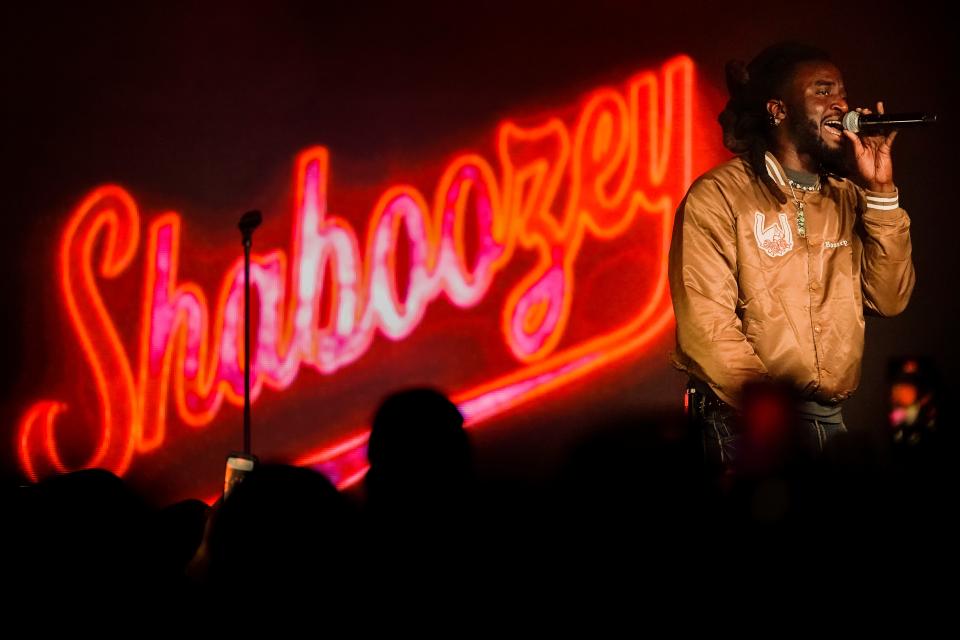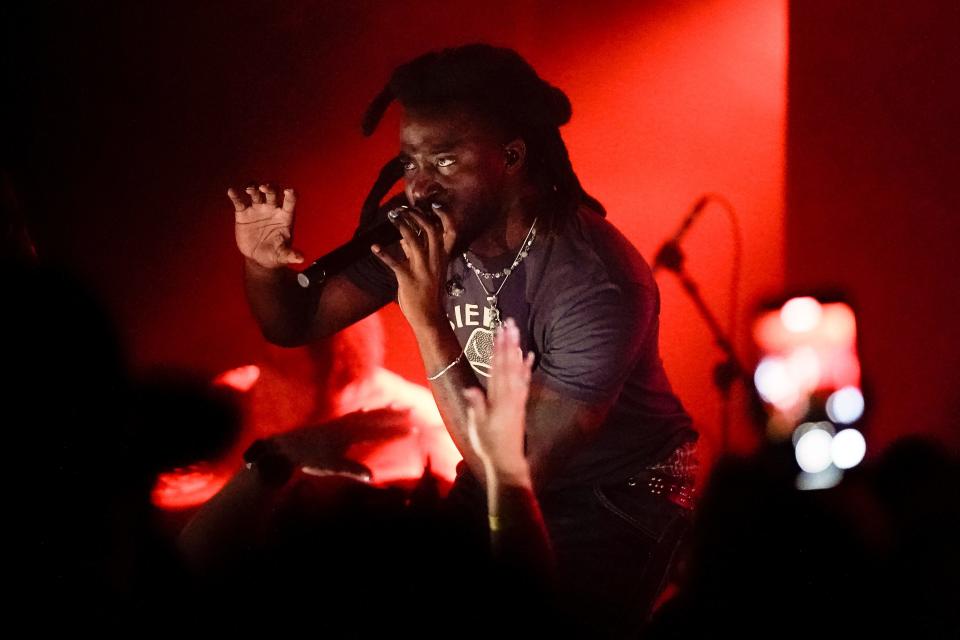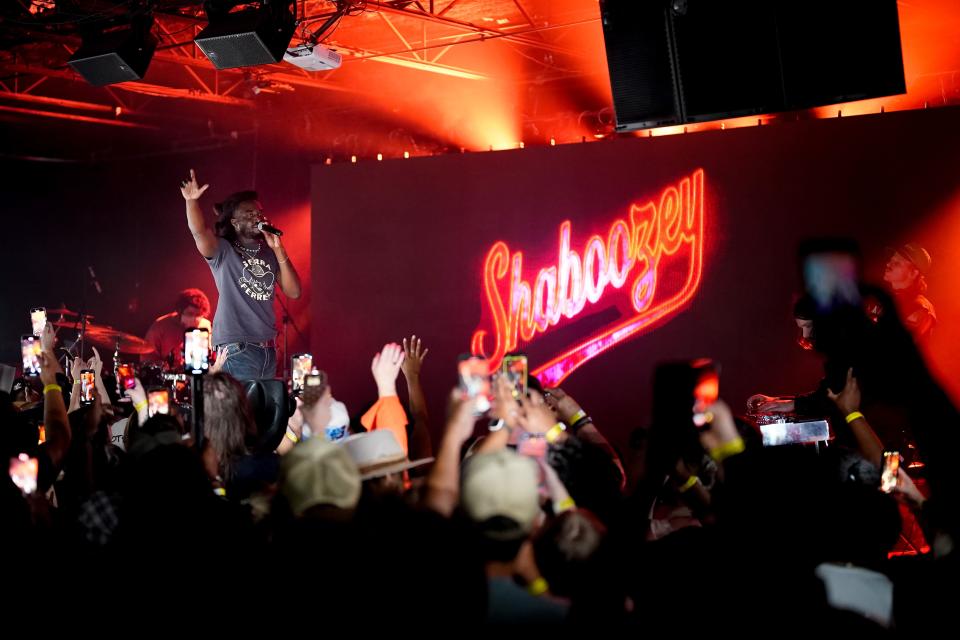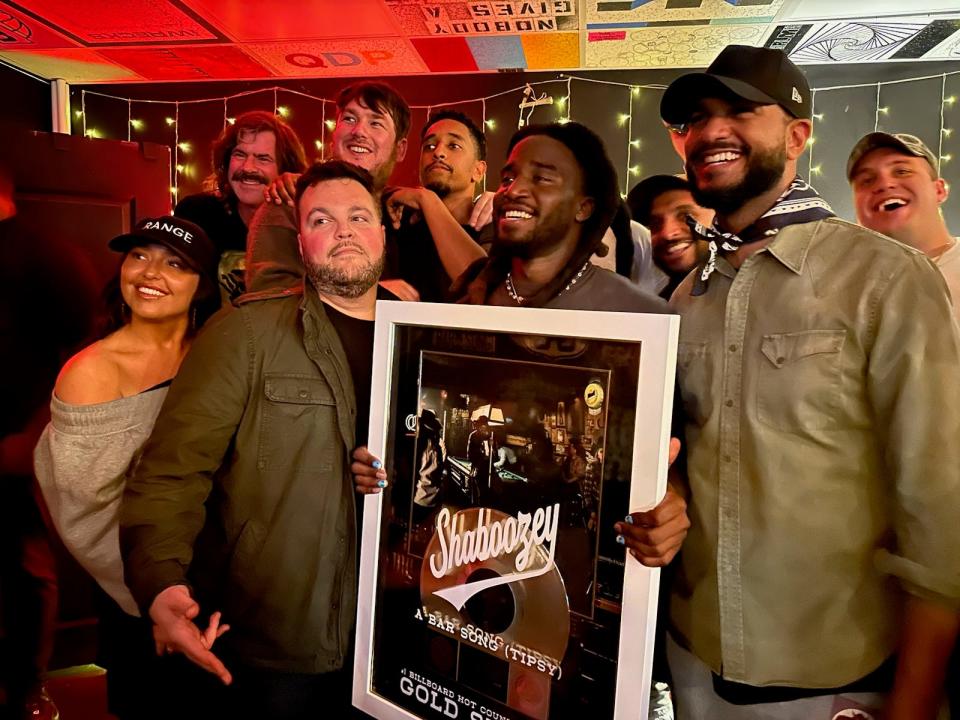Shaboozey brings 'Tipsy,' surging country success to Nashville's Basement East
As of last week, more people have recently been playing Shaboozey's "A Bar Song (Tipsy)" at watering holes than Chris Stapleton's "Tennessee Whiskey" at roadside diners.
TouchTunes jukebox statistics aren't stadium concert sales.
However, they're a fine indication of why, after jet-setting nearly 10,000 miles across North America (including the recent Academy of Country Music Awards) in the past week, the dreadlocked, veteran Nigerian-American performer with one of the best-selling country songs in America sold out Basement East on Monday night.

Following the event, he received a gold record backstage for his song about kicking back and drinking Jack Daniels whiskey. The song interpolates a 20-year-old rap song, "Tipsy" by J-Kwon, a No. 1 hit that, similar to Shaboozey's version two decades later, stalled without hitting the top of Billboard's all-genre Hot 100 chart.
Shaboozey's success isn't just related to the fact that he's also guest-featured on Beyoncé's "Cowboy Carter" album tracks "Spaghettii" and "Sweet Honey Buckiin'."
However, that certainly helped him sell four times more tickets than initially expected when his concert date was originally booked at The Basement, a 150-person capacity club across town from the Basement East.
But that's only part of the story.
How did we get here?
For likely as long as Beyoncé, Shaboozey has been crafting and honing a nuanced and sonic-driven take on country music and Western culture.
Because Beyoncé is one of the world's dominant pop artists, she's developed her take on country music by attending and then headlining the Houston Rodeo and eventually playing "Daddy Lessons" with The Chicks in an infamous performance in front of thousands at Bridgestone Arena at the Country Music Association Awards. Seven years later, she released an album that stopped the world and made everyone form snap judgments and opinions they've advanced and retreated from multitudes of times in the last three months.

Instead, Shaboozey crafted his take by blending his roots in Washington, D.C.'s Northern Virginian suburbs — and being raised by parents who still, to this day, raise chickens — with that area's vaunted folk history (John Denver and Emmylou Harris are among the artists whose journeys included time spent near the campus of Georgetown University) and awareness of the country's foundational core, including Patsy Cline being from 100 miles northwest of him in Winchester, Virginia, plus Southwestern Virginia's rural environs counting The Carter Family as natives.
In the past seven years, his take on country music has, like Beyoncé's, been blended with America's now perpetual tastes in hip-hop culture influencing everything and also been, for the most part, less than successful.
He released his first project, 2018's "Lady Wrangler," via Republic Records. This arrived three years after achieving viral renown for "Jeff Gordon," a song capitalizing on the craze behind America's urban demographic favoring neon-colored NASCAR jackets, namely Gordon's No. 24 being surrounded by a rainbow of colors and the DuPont logo.
For the past three years, he's been signed, dropped, gone viral a few more times and finally, now signed to EMPIRE, benefitted — like Tanner Adell, Willie Jones, Tiera Kennedy, Reyna Roberts and Brittney Spencer — from Beyoncé finally arriving at her most cohesive vision yet of what country music's aesthetics, legacy and sound mean to her.
The Bootcut Kid
More than any other Black artist making country music at present, Shaboozey has the most fully fleshed and easy-to-execute vision of himself as an artist, cultural agitator and bottom-line commercial impactor of country music's already lucrative mainstream industry.
His 2022 album "Cowboys Live Forever, Outlaws Never Die" found him, now traveling free of just being a Northern Virginian, able to visualize the notion of being "The Bootcut Kid," a gunslinging, bittersweetly lovelorn outlaw of sorts, robbing trains from Dodge City, Kansas, to Bakersfield, California. A broad swath of culture is involved there, which for country and Western traditionalists likely doesn't add up — Wyatt Earp to Merle Haggard? Bat Masterson to Dwight Yoakam? Does it make sense?

Clearly, for country's latest demographic of interest — streaming listeners whose burgeoning interest in country music and the Nashville industry's influence has caused additions to Spotify's Top 50 songs in America to jump 2,000% in the past decade and caused Billboard's all-genre Hot 100 year-end pop chart to reflect 100% more interest in country and Nashville machine-influenced music — none of this matters.
Shaboozey has probably performed less than 500 times in the past decade, including open mics and songwriting rounds.
He's not just a Nashville outsider; he's a music industry outsider, too. Live at Basement East, he drew a crowd mixed between country-adoring yet progressive-minded provocateurs and curious people who own one piece of Western apparel with enough disposable income to head to an indie venue for a live concert.
Thus, for them, video wall images of '70s-era Chevy trucks and roadside bars coupled with the sounds of Fender Stratocasters, drums kicking into sounds akin to Johnny Cash's "Ghost Riders In The Sky" and crooning wails on songs like "Annabelle," "Beverly Hills" and "Vegas" awaken everything from Gene Autry to Charley Pride (or, if you're paying attention, opener Tre Burt and the legend who championed him, John Prine) is enough.
Will it work?
Country music is a century-old genre with invisible rules and regulations that trip up an authentic cowboy if they've had one shot too many. Shaboozey's admittedly a double-shot guy who owns up to inventing a cowboy narrative for himself. Thus, if playing the home game and minimally aware of country music's mainstream industry, he is likely quadruple-impacted by his race, roots, sound and stereotyping.
But then listen to what he has in store for his third album, "Where I've Been, Isn't Where I'm Going," which is out on May 31.

Songs like "Drink Don't Need No Mix" double down on the style that's keyed success for artists like himself, plus bar-partying, hip-hop-loving boot-wearers like Post Malone and Morgan Wallen. The track's final version includes rising Houston rap favorite BigXthaPlug.
Like how "Tipsy" blends 20-year-old rap with modern country's unique bevy of influences, "Drink Don't Need No Mix" takes artists like Mike Jones, Slim Thug and Paul Wall's platinum-selling Houston rap success with 2005's "Still Tippin'" and blends it with an era where Lil Durk and Wallen's "Broadway Girls" also achieved platinum acclaim.
Five years ago, Shaboozey, a performer born east of Virginia's Massanutten River, noted onstage that he was attempting to "leave the things that held (him) back."
Five years later, he's well on his way to becoming a platinum-selling performer co-signed by one of the world's most impactful artists. He's also developing a vision that best synergizes America's modern-era curiosity with country music and the genre's storied legacy.
The line between a cowboy who lives forever and an outlaw who never dies is assuredly a career that fades away. On Monday evening, 600 people in Nashville wildly cheered in hopes that Shaboozey's work continues to appeal to ears and eyes nationwide.
This article originally appeared on Nashville Tennessean: Shaboozey brings 'Tipsy,' surging country success to Nashville's Basement East
